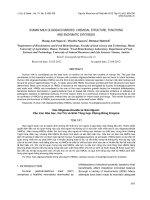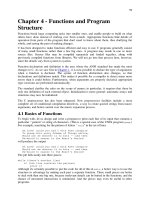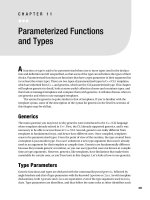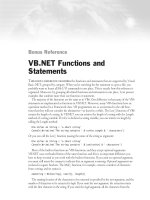Parameterized Functions and Types
Bạn đang xem bản rút gọn của tài liệu. Xem và tải ngay bản đầy đủ của tài liệu tại đây (745.18 KB, 32 trang )
285
■ ■ ■
CHAPTER 11
Parameterized Functions
and Types
A
function or type is said to be parameterized when one or more types used in the declara-
tion and definition are left unspecified, so that users of the type can substitute the types of their
choice. Parameterized functions are functions that have a type parameter in their argument list
(or at least the return type). There are two types of parameterized types in C++/CLI: templates,
which are inherited from C++, and generics, which are the CLI parameterized type. This chapter
will explore generics in detail, look at some useful collection classes and container types, and
then look at managed templates and compare them with generics. It will also discuss when to
use generics and when to use managed templates.
The syntax for generics is quite similar to that of templates. If you’re familiar with the
template syntax, some of the description of the syntax for generics in the first few sections of
this chapter may be old hat.
Generics
The main question you may have is why generics were introduced to the C++/CLI language
when templates already existed in C++. First, the CLI already supported generics, and it was
necessary to be able to access these in C++/CLI. Second, generics are really different from
templates in fundamental ways, and hence have different uses. Once compiled, templates
cease to be parameterized types. From the point of view of the runtime, the type created from
a template is just another type. You can’t substitute a new type argument that wasn’t already
used as an argument for that template at compile time. Generics are fundamentally different
because they remain generic at runtime, so you can use types that were not known at compile
time as type arguments. However, generics, like templates, have limitations that make them
unsuitable for certain uses, as you’ll see later in this chapter. Let’s look at how to use generics.
Type Parameters
Generic functions and types are declared with the contextual keyword generic, followed by
angle brackets and a list of type parameters with the keyword typename or class. As with template
declarations, both typename and class are equivalent, even if the type argument used is not a
class. Type parameters are identifiers, and thus follow the same rules as other identifiers such
Hogenson_705-2C11.fm Page 285 Wednesday, October 18, 2006 5:09 PM
286
CHAPTER 11
■
PARAMETERIZED FUNCTIONS AND TYPES
as variable names. The type parameter identifier is used as a placeholder for the type in the
function or type definition. Listing 11-1 shows a generic function declaration.
Listing 11-1. Declaring a Generic Function
generic <typename T>
void F(T t, int i, String^ s)
{
// ...
}
This declaration creates a generic function, F, that takes three arguments, the first of which
is an unspecified type. If more than one type parameter is to be used, they appear in a comma-
separated list, as shown in Listing 11-2.
Listing 11-2. Declaring Multiple Generic Parameters
generic <typename T, typename U>
void F(T t, array<U>^ a, int i, String^ s)
{
// ...
}
The type parameter in a generic class or function can be used anywhere a type is used, for
example, directly as a parameter or in aggregate type such as an array. The type parameter is
capable of standing in for both value types as well as reference types.
Generic Functions
Generic functions are declared, defined, and used as in Listing 11-3.
Listing 11-3. Declaring, Defining, and Using a Generic Function
// generic_functions1.cpp
using namespace System;
generic < typename T>
void GenericFunction(T t)
{
Console::WriteLine(t);
}
int main()
{
int i;
// Specify the type parameter.
GenericFunction<int>( 200 );
Hogenson_705-2C11.fm Page 286 Wednesday, October 18, 2006 5:09 PM
CHAPTER 11
■
PARAMETERIZED FUNCTIONS AND TYPES
287
// Allow the type parameter to be
// deduced.
GenericFunction( 400 );
}
As you can see in this example, the generic function is called by using the function name,
possibly followed by angle brackets and the type arguments to be substituted for the type
parameters. I say “possibly” because if type arguments are omitted, the compiler attempts to
deduce them from the types supplied to the function as arguments. For example, if a generic
function takes one parameter and the type of that parameter is a type parameter, and if the
type of the object supplied is, say, String, the type argument is assumed to be String and may
be omitted.
The type parameter need not be an actual argument type; however, it must appear in the
argument list or as the return value. It may appear in a compound type, such as an array, as in
Listing 11-4.
Listing 11-4. Using a Generic Array As a Parameter
// generic_functions2.cpp
using namespace System;
generic < typename T>
void GenericFunction(array<T>^ array_of_t)
{
for each (T t in array_of_t)
{
Console::WriteLine(t);
}
}
int main()
{
array<String^>^ array_of_string;
array_of_string = gcnew array<String^>
{ "abc", "def", "ghi" };
// Allow the type parameter to be
// deduced.
GenericFunction( array_of_string );
}
While deduction works on compound types, it doesn’t work if the type is used as a return
value. The compiler won’t try to deduce the generic type argument from the left side of an
assignment, or any other use of a return value. When only the return value of a generic function
is generic, or if the generic type parameter doesn’t even appear in the function signature, the
type argument must be explicitly specified, as in Listing 11-5.
Hogenson_705-2C11.fm Page 287 Wednesday, October 18, 2006 5:09 PM
288
CHAPTER 11
■
PARAMETERIZED FUNCTIONS AND TYPES
Listing 11-5. Explicitly Specifying a Type Argument
// generic_return_value.cpp
using namespace System;
generic <typename T>
T f()
{
return T();
}
int main()
{
int i = f<int>(); // OK
String^ s = f<String^>(); // OK
double d = f(); // Error! Can't deduce type.
}
Generic Types
Like generic functions, the declaration of a generic type differs from a nongeneric declaration
by the appearance of the contextual keyword generic followed by the type parameter list. The
type parameter may then be used in the generic definition wherever a type is used, for example,
as a field, in a method signature as an argument type or return value, or as the type of a property, as
shown in Listing 11-6.
Listing 11-6. Using a Generic Type
// generic_class1.cpp
using namespace System;
generic <typename T>
ref class R
{
T t;
public:
R() {}
property T InnerValue
{
T get() { return t; }
void set(T value) { t = value; }
}
};
Hogenson_705-2C11.fm Page 288 Wednesday, October 18, 2006 5:09 PM
CHAPTER 11
■
PARAMETERIZED FUNCTIONS AND TYPES
289
int main()
{
double d = 0.01;
int n = 12;
// Create an object with T equal to double.
R<double>^ r_double = gcnew R<double>();
// Create an object with T equal to int.
R<int>^ r_int = gcnew R<int>();
r_double->InnerValue = d;
r_int->InnerValue = n;
Console::WriteLine( r_double->InnerValue );
Console::WriteLine( r_int->InnerValue );
}
The types created from a generic type, such as R<double> and R<int> in Listing 11-6, are
referred to as constructed types. Two or more types constructed from the same generic type are
considered to be unique, unrelated types. Thus, you cannot convert from R<double> to R<int>.
When a generic class or function is compiled, a generic version of that function or class is
inserted into the assembly or module created for that source code. At runtime, constructed
types are created on demand. Thus, it is not necessary to know at compile time all the possible
types that might be used as type parameters. However, this freedom also means that the compile-
time restrictions must be greater; otherwise, you would risk adding an incompatible type in at
runtime, which might not have all the features required. When the compiler interprets the
code for a generic class, it only allows methods, properties and other constructs to be called on
the unknown type that are certain to be available. This ensures the type safety of generic types,
since otherwise it would be possible to create a generic type that compiled but failed at runtime
when the method used was not available. This restriction imposes constraints on the code you
can use in your generic functions and types.
For example, the code in Listing 11-7 won’t compile.
Listing 11-7. Compiler Restrictions on Generic Types
// invalid_use_of_type_param.cpp
generic <typename T>
ref class G
{
T t;
public:
Hogenson_705-2C11.fm Page 289 Wednesday, October 18, 2006 5:09 PM
290
CHAPTER 11
■
PARAMETERIZED FUNCTIONS AND TYPES
G()
{
t = gcnew T("abc", 100); // Error: T may not have
// a compatible constructor.
t->F(); // Error: T may not have F.
}
};
Listing 11-7 will produce the compiler error:
invalid_use_of_type_param.cpp(12) : error C3227: 'T' : cannot use 'gcnew' to
allocate a generic type
invalid_use_of_type_param.cpp(14) : error C2039: 'F' : is not a member of
'System::Object'
c:\windows\microsoft.net\framework\v2.0.50727\mscorlib.dll : see
declaration of 'System::Object'
As you can see, the first complaint is that gcnew is not available on a generic type parameter;
the second error occurs because the compiler is only willing to allow methods that are available on
System::Object.
There is a way to get around these restrictions. If you need to use specific features of a type,
you must constrain the generic so that only types with those features are allowed to be used as
type arguments. You’ll see how to do that in the section “Using Constraints.” But first, let’s look
at a typical generic class implementing a simple collection.
Generic Collections
Generics are most often used to implement collection classes. Generic collection classes are
more type-safe and can be faster than the alternative—nongeneric collection classes relying on
handles to Object to represent items in the collection. The main efficiency gain is that the retrieval
of items from the collection can be done without the use of casts, which usually requires a
dynamic type check when the type is retrieved from the collection, or maybe even when adding
elements to the collection. Also, if you are using value types, you can often avoid boxing and
unboxing entirely by using a generic collection class. In addition to efficiency gains, if you use
a generic type, you automatically force the objects in the collection to be of the appropriate
type. Since most collections hold objects of the same type (or perhaps types with a common
base type), this helps avoid programmatic errors involving adding objects of the wrong type to
the collection. In addition, having the strongly typed collection leaves no doubt as to type needed,
which is a relief to anyone who has had to try to figure out what type(s) a poorly documented,
weakly typed collection takes.
In order to use the for each statement on a generic collection, the collection must imple-
ment the IEnumerable interface, and you must implement an enumerator class to walk through
each element of the collection. Listing 11-8 shows the use of generics to create a linked list class
that supports the for each statement to iterate through the generic collection. The generic
collection implements IEnumerable, and an enumerator class implementing the IEnumerator
interface is created to allow the for each statement to work.
Hogenson_705-2C11.fm Page 290 Wednesday, October 18, 2006 5:09 PM
CHAPTER 11
■
PARAMETERIZED FUNCTIONS AND TYPES
291
Listing 11-8. Creating a Linked List That Can Be Traversed with for each
// generic_list.cpp
using namespace System;
using namespace System::Collections::Generic;
// ListNode represents a single element in a linked list.
generic <typename T> ref struct ListNode
{
ListNode<T>(T t) : item(t) { }
// The item field represents the data in the list.
T item;
// the next node in the list;
ListNode<T>^ next;
};
// List represents a linked list.
generic <typename T> ref class MyList : IEnumerable<ListNode<T>^>
{
ListNode<T>^ first;
public:
property bool changed;
// Add an item to the end of the list.
void Add(T t)
{
changed = true;
if (first == nullptr)
{
first = gcnew ListNode<T>(t);
}
else
{
// Find the end.
ListNode<T>^ node = first;
while (node->next != nullptr)
{
node = node->next;
}
node->next = gcnew ListNode<T>(t);
}
}
Hogenson_705-2C11.fm Page 291 Wednesday, October 18, 2006 5:09 PM
292
CHAPTER 11
■
PARAMETERIZED FUNCTIONS AND TYPES
// Return true if the object was removed,
// false if it was not found.
bool Remove(T t)
{
changed = true;
if (first == nullptr)
return false;
if (first->item->Equals(t))
{
// Remove first from list by
// resetting first.
first = first->next;
return true;
}
ListNode<T>^ node = first;
while(node->next != nullptr)
{
if (node->next->item->Equals(t))
{
// Remove next from list by
// leapfrogging it.
node->next = node->next->next;
return true;
}
node = node->next;
}
return false;
}
property ListNode<T>^ First
{
ListNode<T>^ get()
{
return first;
}
}
private:
virtual System::Collections::IEnumerator^ GetEnumerator_NG() sealed
= System::Collections::IEnumerable::GetEnumerator
{
return GetEnumerator();
}
Hogenson_705-2C11.fm Page 292 Wednesday, October 18, 2006 5:09 PM
CHAPTER 11
■
PARAMETERIZED FUNCTIONS AND TYPES
293
virtual IEnumerator<ListNode<T>^>^ GetEnumerator_G() sealed
= IEnumerable<ListNode<T>^>::GetEnumerator
{
return GetEnumerator();
}
public:
IEnumerator<ListNode<T>^>^ GetEnumerator()
{
ListEnumerator<T>^ enumerator = gcnew ListEnumerator<T>(this);
return (IEnumerator<ListNode<T>^>^) enumerator;
}
// ListEnumerator is a struct that walks the list, pointing
// to each element in turn.
generic <typename T> ref struct ListEnumerator : IEnumerator<ListNode<T>^>
{
ListNode<T>^ current;
MyList<T>^ theList;
bool beginning;
ListEnumerator<T>(MyList<T>^ list) : theList(list), beginning(true)
{
theList->changed = false;
}
private:
virtual property Object^ Current_NG
{
Object^ get() sealed =
System::Collections::IEnumerator::Current::get
{
return (Object^) Current;
}
}
virtual property ListNode<T>^ Current_G
{
ListNode<T>^ get() sealed = IEnumerator<ListNode<T>^>::Current::get
{
return Current;
}
}
public:
Hogenson_705-2C11.fm Page 293 Wednesday, October 18, 2006 5:09 PM
294
CHAPTER 11
■
PARAMETERIZED FUNCTIONS AND TYPES
property ListNode<T>^ Current
{
ListNode<T>^ get()
{
if (theList->changed)
throw gcnew InvalidOperationException();
return current;
}
}
virtual bool MoveNext()
{
if (theList->changed)
throw gcnew InvalidOperationException();
beginning = false;
if (current != nullptr)
{
current = current->next;
}
else
current = theList->First;
if (current != nullptr)
return true;
else
return false;
}
virtual void Reset()
{
theList->changed = false;
current = theList->First;
}
~ListEnumerator() {}
}; // end of ListEnumerator
}; // end of MyList
int main()
{
MyList<int>^ int_list = gcnew MyList<int>();
int_list->Add(10);
int_list->Add(100);
int_list->Add(1000);
int_list->Add(100000);
Hogenson_705-2C11.fm Page 294 Wednesday, October 18, 2006 5:09 PM
CHAPTER 11
■
PARAMETERIZED FUNCTIONS AND TYPES
295
int_list->Add(500);
int_list->Remove(10);
int_list->Remove(1000);
int_list->Remove(500);
int_list->Add(50);
// Iterate through the list using the for each statement,
// displaying each member of the list at the console.
for each (ListNode<int>^ node in int_list)
{
Console::WriteLine(node->item);
// int_list->Remove(50); // danger: modifying the collection
}
}
The output of Listing 11-8 is as follows:
100
100000
50
There are a few points to notice about Listing 11-8. Recall the IEnumerable implementation
on a deck of cards in Chapter 9 (Listing 9-15). In that example, we chose to implement the
nongeneric IEnumerable. Implementing the generic IEnumerable<T> adds an additional layer of
complexity because IEnumerable<T> also inherits from IEnumerable. That means MyList must
implement two different versions of GetEnumerator: one for the generic IEnumerable and one
for the nongeneric interface. This is done via explicit interface implementation. In fact, just as
in Listing 9-15, we make the interface implementation methods private and define a public
method that for each actually uses and that the private interface implementation functions
call. This helps improve performance since the enumeration does not require a virtual func-
tion call.
Note also that we had to add a destructor to the ListEnumerator class. Without the destructor,
the compiler complains that we did not implement IDisposable::Dispose. This is because
IEnumerator<T> also inherits from IDisposable (the nongeneric IEnumerator does not). A C++/CLI
destructor on a managed type is emitted as the Dispose method, as discussed in Chapter 6.
Finally, we have added a Boolean field in MyList that detects whether MyList is changed
during the enumeration. As you may recall, in Listing 9-15, we made a copy of the card deck
and used it in the enumerator class. With this version, you avoid the copy, which could be
expensive for a large list, and instead generate an exception when the list is modified. To demon-
strate the exception, try uncommenting the line calling the Remove method during the iteration.
If we permitted the item to be successfully removed during the iteration, the collection would
be considered corrupted, and the enumeration would produce undefined results. The behavior of
for each would not be as expected and would be very confusing for consumers of the type.
Unless you create a working copy of the collection, you should always implement some code
that checks that the type has not been modified.
Hogenson_705-2C11.fm Page 295 Wednesday, October 18, 2006 5:09 PM
296
CHAPTER 11
■
PARAMETERIZED FUNCTIONS AND TYPES
Using Constraints
The restriction noted previously on the use of methods, properties, and other constructs on a
type parameter would severely limit the usefulness of generic types, were it not for the ability
to get around the restriction by using constraints. Constraints are specific requirements put on
a type parameter that limit, or constrain, the types that may be used as type arguments. Essen-
tially, the constraints limit the possible type arguments to a subset of all possible types. By
imposing constraints, you may write generic code that uses the methods, properties, and other
constructs supported by the constrained subset of types. There are several types of constraints:
interface constraints, class constraints, the gcnew constraint, and constraints that limit the type
arguments to either reference types or value types.
Interface Constraints
Interface constraints indicate that the type parameter must implement the specified interface
or interfaces. When an interface constraint is applied to the type parameter, you may use
methods of that interface in your generic type definition (see Listing 11-9).
Listing 11-9. Specifying Interface Constraints
// interface_constraint.cpp
interface class I
{
void f();
};
// The constraint is introduced with the where keyword
// and requires that T inherit from I.
generic <typename T> where T : I
ref class R
{
T t;
public:
R(T t_in) : t(t_in)
{
// Call the method on I.
// This code would not compile without
// the constraint.
t->f();
}
};
Hogenson_705-2C11.fm Page 296 Wednesday, October 18, 2006 5:09 PM









